Bird Box: Adapting from Debut Novel to Silver Screen
One of the many tools when writing horror is to utilize the universal fear of the unknown. An author who has mastered horror knows that readers fear most what they cannot explain, and oftentimes what is left unseen to them in a story can be the most horrifying. They can expertly wield cognitive dissonance and other literary devices in order to build stories around these aspects. In his 2014 debut novel Bird Box, Josh Malerman does just this, filling his readers with the fear of unknown “monsters” that become the harbinger of a worldwide apocalypse. In December 2018, Netflix released a cinematic adaptation of this novel, which has left fans of the original wondering: how well can this type of story translate to the silver screen?
This article will explore the elaborate reality woven within Malerman’s novel. It will also explore the fundamentals of what makes a good horror story absolutely terrifying. Finally, it will examine the novel in comparison with the new movie adaptation by taking into account the acting, the screenwriting, and the editorial choices. For those who have yet to read the book, or see the cinematic counterpart, this article does contain spoilers.
A Look at the Novel
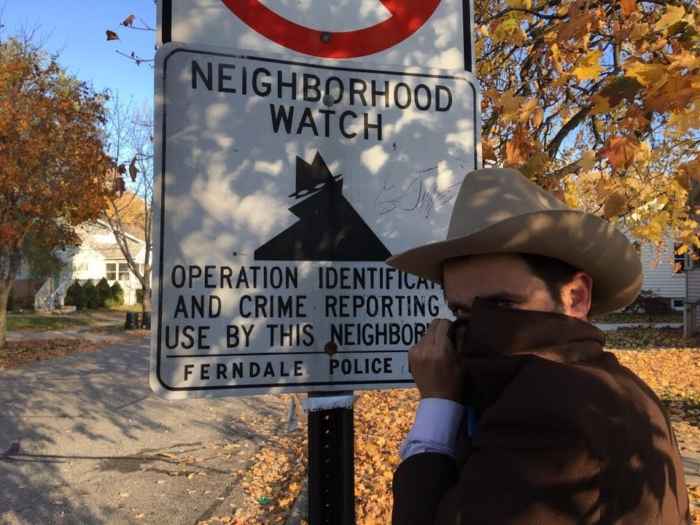
Bird Box, written by Josh Malerman and published by HarperCollins (2014) 1 opens on Malorie, the protagonist, agonizingly trying to decide whether or not to journey with her young children to a safe haven upriver. She has two four-year-olds to protect in the midst of a worldwide apocalyptic event that has been wiping out the human race in masses. The world has been infiltrated by entities that, when seen, forces the seer to fly into a mindless, violent rage, killing anyone in their proximity, and then commit suicide. But the novel never references what these entities look like.
“What do you think people are seeing?” Malorie asks Shannon. “I don’t know, Mal. I just don’t know.” The sisters ask each other this question constantly. It’d be impossible to count the number of theories that have been birthed online. All of them scare the hell out of Malorie. Mental illness as a result of the radio waves in wireless technology is one. An erroneous evolutionary leap in humankind is another. New Agers say it’s a matter of humanity being in touch with a planet that is close to exploding, or a sun that is dying. Some people believe there are creatures out there. 2
This mystery leaves the reader wondering what something so horrific could possibly look like, and not knowing cultivates this strong fear of the unknown. To survive, Malorie, Tom, and the rest of the housemates decide to navigate their world outside while blindfolded. Throughout the novel Malerman forces his characters to leave the safety of their homes to blindly explore a hostile world, and their sight becomes a luxury.
A Look at Horror
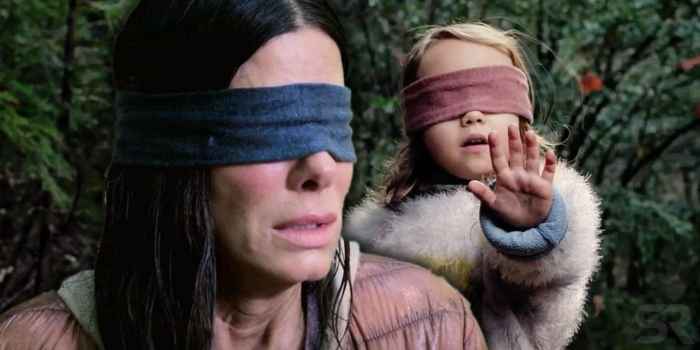
What makes horror horrific, especially in print, is this fear of the unknown. Malerman expertly plays off this by writing a majority of his scenes without visual descriptions. He leaves his readers with merely what Malorie and the children experience while blindfolded on their journey, and what Malorie, Tom, and many other characters experience while inside the house. Although he describes their inside world in great detail, the outside world and what has become of it is left mostly an ambiguous mystery.
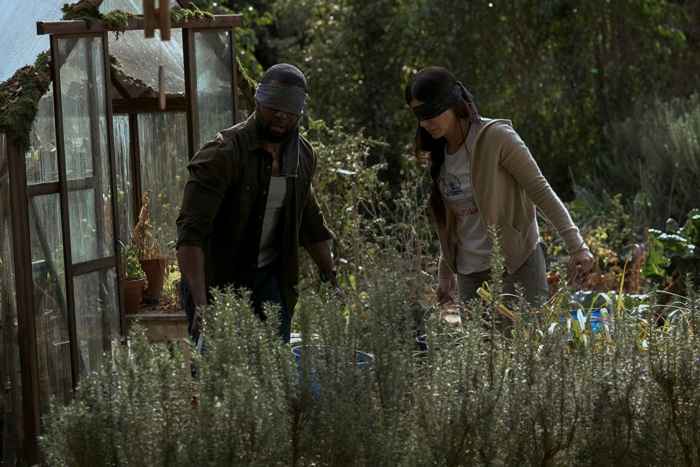
By playing with the timeline, he also creates a strong cognitive dissonance by essentially telling two stories in tandem. One being the beginning of the apocalypse before Malorie gives birth, right as the murders begin to take place. The second follows Malorie and her children as they leave the safety of their house, journey on the river, and eventually arrive at the supposed ‘safe haven’. This helps to keep readers on edge by making them constantly question where they are in the story. Again, supporting this fear of the unknown.
Malerman also utilizes literary devices such as repetition and rhetorical questions. In his writing style he repeats the same lines over and over, not so much as to become overused, but more so to encourage the same discomfort for his readers. For example, the line “How far can a person hear?” 3 is repeated several times throughout the text, as not only a reminder to the reader that hearing is imperative, but that danger is imminent. Asking “how far” prompts the reader to wonder if there is immediate danger just beyond the protagonists’ hearing capabilities. It is these elements that create such a strong storytelling experience, evoking both horror and terror within Malerman’s readers.
A Look at the Movie
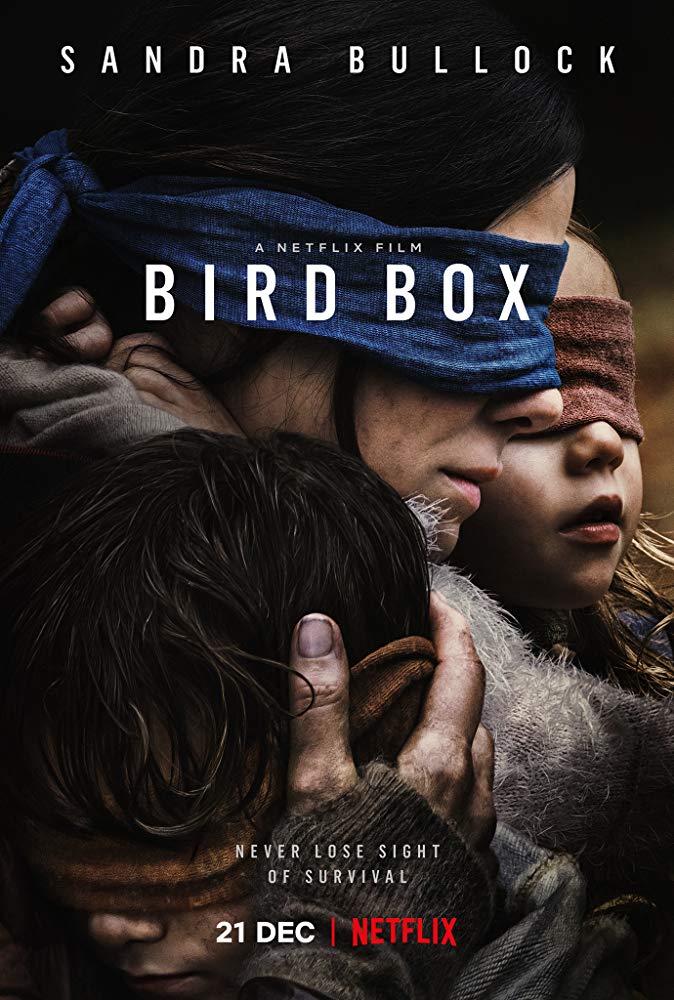
The 2018 Netflix original film is directed by Susanne Bier and stars Sandra Bullock. 4 The movie opens on Malorie, Boy, and Girl preparing to make their journey on the river. Although this opening scene does quote the book when Malorie says: “Under no circumstances will either one of you remove your blindfold. If you do, I will hurt you. Do you understand?” 5 the similarities between the book and the movie seem to end here. The cinematic adaptation is a different entity in comparison with the novel, as Bier tries to convey the same elements but in very different ways.
In an interview with Rolling Stone, Malerman admitted that he had no say in the movie version of Bird Box. 6 He also told Publishing Perspectives that if he had had the choice he “would have at least half the movie in complete darkness.” Nevertheless, he loves the outcome of the film, the screenplay, and Bier’s interpretation. 7
Rotten Tomatoes stated that the movie “never quite reaches its intriguing potential”, and they continue to give a 62% on the tomatometer. 8 Whereas Publisher Weekly called Malerman’s novel a “lean, spellbinding thriller that Stephen King fans will relish.” 9 Although the reviews are mixed, the story itself withstands the criticism and continues to rise in popularity.
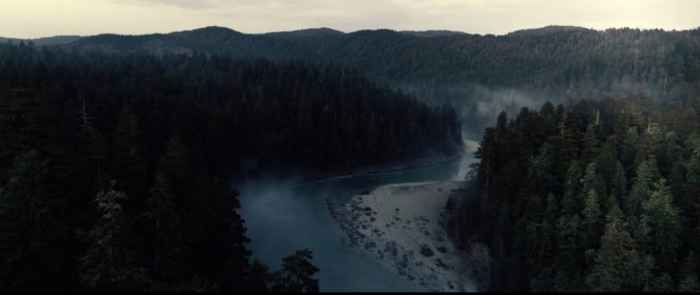
The Dilemma
Although Bier did a fantastic job in portraying the “monsters” without actually revealing them to the viewers, she still has to provide some sort of visual image on the screen. So she deviates from the book by providing wind and whispering voices to promote a similar fear. But viewers lose a bit of the terror that readers experienced because, by physically seeing it on screen, there isn’t much left to the imagination. Furthermore, something that was not thoroughly discussed in the book was a physical change that overcame anyone who “saw” the entities. The movie depicts this rapid physical change with dilating pupils, changed facial expressions, and a sort of Mad Hatter smile. This, too, removes that fear of the unknown because it is made known to the viewers visually.
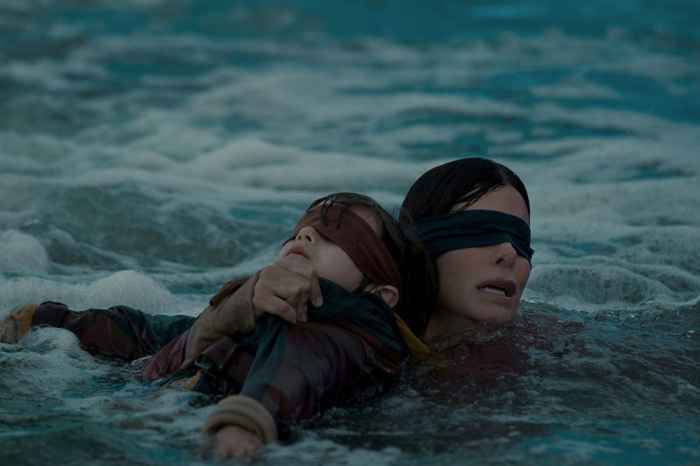
In the movie, scenes of the present-day river journey are intermingled with scenes from past events in the house and before the apocalyptic events occur, contributing to the cognitive dissonance. However, it all just barely misses the mark in comparison with the novel. By dividing the book into very short chapters, and alternating the chapters in the timeline, Malerman creates a unique discordance that is at the same time cohesive; one chapter begins with similar elements mirroring the end of the previous chapter. The movie does not have this cohesion. Short scenes are clipped together to create tension, mimicking Malerman’s writing style, while graphic, outright brutal murders and suicides are shown blatantly trying to convey a “shock factor”. This, in turn, proves to distract from the overall atmosphere.
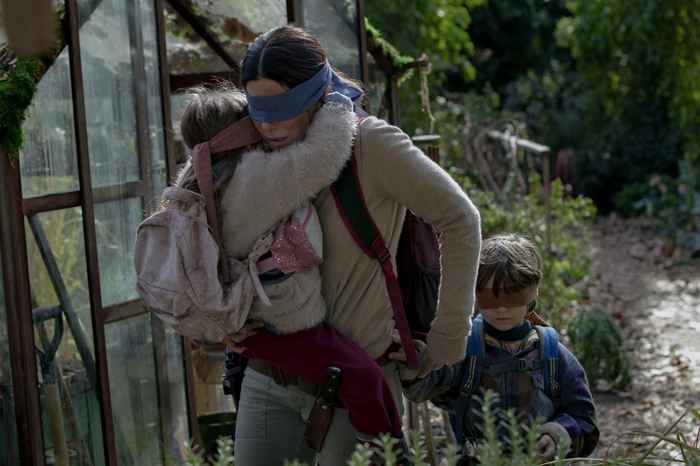
Another element from the novel that the movie lacks is Malorie’s rich inner monologue, especially on the river scenes. The movie is confined to visual and audio elements and can be restricted by the lack of the internal monologue it can incorporate. Thus, it loses a good bit of Malorie’s character development, leaving the audience with less information as to what is going on within her headspace. According to People Magazine, Bullock said that her performance in Bird Box was “a deep, emotional love story about what is family, what’s happening in the world, what’s making people harm themselves that’s so hard to look at.” 10 Although Bullock’s portrayal of Malorie is outstanding, her performance is hindered by the lack of this character arc.
With all this being said, it is perhaps the ending that is the most controversial difference between the cinematic adaptation and the novel. The differences boil down to the grotesque measures that Rick and the other survivors at Tucker resorted to in their early days.
“It wasn’t a matter of choice,” Rick continues. “We blinded ourselves with whatever we had—forks, kitchen knives, our fingers. Blindness, Malorie, was the absolute protection. But that was the old way. We don’t do that anymore. After a year, we realized we’d fortified this place enough to lighten this awful burden on our shoulders. So far, we’ve had no security lapses.” 11
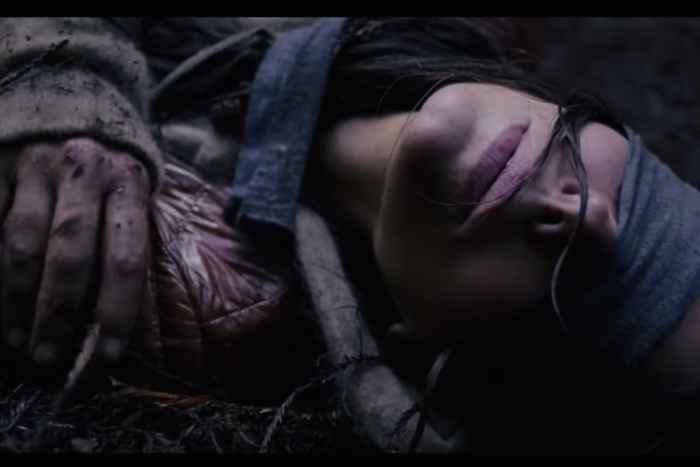
This ending is dark and foreboding. The extreme measures that everyone at Tucker endures reminds the readers of what these characters would resort to in order to survive. Despite the safe haven utopia that Tucker conveys, there is a lingering fear that “something” could still happen. It implies to readers that safety is liminal.
The movie opts for a fairy-tale happy ending that most viewers could be dissatisfied with in comparison to the book. The closing scene shows Malorie, Boy, and Girl safe in an enclosed garden surrounded by people who are smiling and children who are playing. Malorie asks the children if they would like to release the birds they have been carrying with them in a shoe box (also not in the novel), and they watch as three little birds fly up to join a flock in the canopy overhead. There is sunlight, laughter, butterflies, and viewers are left with their happily-ever-after that is more or less satisfying. 12 But this candy-coated version loses that strong fear of the unknown that Malerman worked so hard to culture. The viewers are left to conclude that Malorie, her children, and the settlement are able to live out their days in harmonious peace. This could be satisfying for some audiences, but the whole story had been building towards a much grander ending and some of it was lost with these editorial choices.
It is these differences, these particular choices, these minute details that come together to create two very strong, but very different, works of fiction that tell similar stories. Although Bier utilized great editing, vibrant scenery, and a cast with strong acting skills, the cinematic rendition of Bird Box falls short of creating the same world as the novel. The movie, albeit intense and certainly terrifying in its own right, suffers without Malerman’s cohesion, and the lack of visual descriptions are lost in the cinematic counterpart. Because of this there is a certain level of horror that does not translate well from print to film. Elements such as the fear of the unknown and cognitive dissonance are also lost on the viewers due to particular editorial choices. Thus, fans of the book are left knowing that the novel Malerman originally created will forever remain the epitome of expertise in this genre.
Works Cited
- Malerman, Josh. Bird Box. United States, Harper Collins, 2014. E-book. ↩
- Malerman, Josh. Bird Box. United States, Harper Collins, 2014. E-book. 26 p. ↩
- Malerman, Josh. Bird Box. United States, Harper Collins, 2014. E-book. 18-19 p. ↩
- “Bird Box (2018).” IMDb.com, n.d. Web. Accessed 1 Jan. 2019. https://www.imdb.com/title/tt2737304/ ↩
- Malerman, Josh. Bird Box. United States, Harper Collins, 2014. E-book. 10 p. ↩
- Browne, David. “‘Bird Box’: Meet the Indie-Rock Lifer Behind the Netflix Hit.” Rolling Stone, 23 Jan. 2019. Web. Accessed 27 Jan. 2019. https://www.rollingstone.com/music/music-features/bird-box-netflix-writer -josh-malerman-782645/ ↩
- Anderson, Porter. “Books to Film: Josh Malerman on Seeing ‘Bird Box’ Land on Netflix, 45 Million International Accounts Watch.” Publishing Perspectives, 25 Dec. 2018, Web, Accessed 27 Jan. 2019. https://publishingperspectives.com/ 2018/12/boosk-film-author- josh-malerman-bird-box-universal-netflix/ ↩
- “Bird Box.” Rotten Tomatoes. n.d. Web. Accessed 27 Jan. 2019. https://www.rottentomatoes.com/m/bird_box ↩
- Jackson, Todd. “Bird Box.” Josh Malerman Official Website. n.d. Web. Accessed 27 Jan. 2019. http://joshmalerman.com/books/bird-box/ ↩
- Hohman, Muara, and Mary Green. “From Sandra to Sarah to That Blindfold: Everything to Know About Netflix’s New Thriller Bird Box.” People. 27 Dec. 2018. Web. Accessed 27 Jan 2019. https://people.com/movies/bird-box- everything -to-know-sandra-bullock-sarah-paulson/ ↩
- Malerman, Josh. Bird Box. United States, Harper Collins, 2014. E-book. 215 p. ↩
- Bird Box. Directed by Susanne Bier, performances by Sandra Bullock, Trevante Rhodes, and John Malkovich, Bluegrass Films, Chris Morgan Productions, and Universal Pictures. Film. 2018. ↩
What do you think? Leave a comment.











This book was outstanding and haunted my every thought. When I was away from the book I was constantly thinking about it and wondering what is going on. The idea of being blind to what horrors are right in front of you is chilling to the bone. I truly cared about Malorie and her children as if they were my own family.
Me too! I was so devoted to Malorie and her struggles that by the end of the book I was just filled with this chilling sense of “what now”? I was kind of lost when it ended. But that was the beauty of the novel, and why Malerman’s story was so successful.
I’ve read this a while back, and loved it. I think I was freaked out by the prospect of being effectively blind more than anything else. On that note, I’ve heard this book being compared to blindness by Jose Saramago. I have not read it, but am planning to. It probably is not really a horror novel, though.
Not seeing what or where the dangers are would be terrifying for me, too. It’s that fear of the unknown that really drives this story! I haven’t read Blindness by Saramago either, but that sounds like an intriguing comparison; I might add it to my tbr list. Thanks for sharing!
The book was so much better. I couldn’t understand why they changed the ending. The movie was already graphic and bloody so why change the ending?
Yes, exactly! The novel had all the makings for a great movie, and then they decided to make a “happily-ever-after” type ending. I was so mad about it while I was watching.The novel really had a superior (and more terrifying) ending.
Because it would add nothing to the narrative. They changed motivation for the main character, which for Sandra Bullock’s version was mainly about her inability to love and care for people and hope. It would be completely out of left field if they showed gouged out eyes as hope was the only thing going for her at that moment. And it’s one thing to explain it in a book but trying to compress that into a movie doesn’t work so cleanly. It might not be accurate to the book but it was a deserved end for Bullock’s character arc.
Oh, that is a beautifully worded comment! It’s interesting to hear the argument put that way, and I really appreciate the insight. Hope was definitely a stronger theme in the movie than in the book, and by changing the ending, I suppose it would have impacted the overall message. Thank you for sharing! =)
The book was absolutely terrifying in the best way, because it could allow you to enter into a world where everybody had to blind(fold) themselves while they were being hunted… I am still haunted by some of the passages in that book.
And the minute I heard there was going to be a movie, I knew it was going to suck. How are you going to convey the fear and claustrophobia of not being able to see what is hunting you *in a movie*? Never mind of course that you can’t look at the monsters or they drive you insane… A problem in a movie.
Basically, Kascinski took the idea, swapped it for sound which worked better for a film, and made A Quiet Place. Should’ve stopped there.
(I’m not implying he plagiarized it, I’m saying that the idea of being hunted by something that deprives you of using one of your senses is the same in both movies. But one is a lot more suited to film!)
I really enjoyed the book but I agree, couldn’t quite see how to make it work as a movie.
I found the book vaguely unsettling, but very slight, even underwritten – it had very little plot, and was mostly an exercise in atmosphere – and was really an overlength short story. It was never going to translate well to film without substantial changes.
Yes, thank you! There are just some elements that can’t be conveyed via film as well as they can in a novel. Although Bier tried, they were still limited by their medium of storytelling. The novel was fantastic, and horrifying, for different and deeper reasons than the movie could grasp.
That’s a very interesting thought! A Quiet Place and Bird Box do both explore disabilities in a post-apocalyptic setting. But they do it in two very different ways. I don’t think one influenced the other; they just explore the same concepts. I do believe A Quiet Place was a better film of the two, as it successfully executed certain elements (and had a much more satisfying ending), whether or not Malerman’s novel influenced Krasinski at all.
An enjoyable essay to read. I was not that impressed with the movie when I saw it, but this essay adds to make it better with good insight.
Thank you so much! I highly recommend the book, it is a much better portrayal of the story as the movie definitely doesn’t do it justice.
The narrative of a society in meltdown.
Three main story lines of all US movies.
1. FBI agent discovers…
2. Virus causes mass death and or zombie apocalypse….
3. Family caught in high crime…
Anyone seeking original storylines, broader human experience, and some character acting should look outside English speaking world, nothing here folks move on.
Literally no films in 2018 released in cinemas match those premises
You forgot:
4) Families Bonding…..which somehow embraces everything from Die Hard through War of the Worlds to Jurassic Park…..
Sounds like they’ve missed out on a perfect opportunity to further expand the Cloverfield universe.
The largest deviation – how in the movie Mallory doesn’t consider blinding the children at birth, and how, in the book, the sanctuary at the end had people who were also blinding themselves on purpose.
Yes, yes, yes! I was highly disappointed that they omitted Malorie’s scene with Boy and Girl. It was so chilling in the book, and it’s one of the most vivid memories I have from reading it; it would have added a whole new depth to Malorie’s character had they included it. I also agree that the original ending would have been much stronger, too.
I think many people who said they didn’t like the movie are so used to loving movies where they show the “horror” or “creature” whatever it is. This movie wasn’t like that and it’s truly what made it terrifying because it leaves it all up to the imagination and not many people these days appreciate suspense and horror that uses your imagination but instead just shows you the horror and that’s that. I could be wrong it’s just an observation and an opinion and i don’t mean it to be rude.
Indeed, this movie was unique in that it didn’t show the actual “monster” and only hinted at what it was. The book did the same thing in an even stronger way without describing the “creatures” at all, only the consequences of interacting with them, and this made for a truly intriguing perspective. I agree with you that viewers might not be used to this type of film. Thank you for your input!
I didnt have an issue with not seeing the monster but I had an issue not understanding what it was actually capable of. It could lift a car but it couldn’t open the door. It could speak or get kn to your mind but on only at the end? Looking thoroughly the holes of fabric was safe but not at a tv screen? Gary could trick the birds at the beginning of being allowed in the house but birds are still seen as “monster sniffers”? The sanctuary had open ceilings? That is what got me.
Oh, these are some good thoughts! There were definite inconsistencies in the movie that left too many plot holes. Especially Gary being able to elude the birds to enter the house, I hadn’t thought about that! The novel, at least to me, felt like it had fewer of these inconsistencies and was more thought out. Thank you for sharing! =)
I watched the movie and than read the book and I liked both but prefer the book a little more. The movie did some things better than the book (like the woods scenes and stuff like that) but the book was just great. The characters were much better in the book that when they all died I felt it more than I expected and I didn’t as much in the movie (if that makes any sense). I was rooting for them even tho I knew what was going to happen. What happen to them in the book was so dark and horrifying that it made the movie look less sad in comparison. My heart went out for the main character in the book more and I enjoyed her more than the movie version. As for the ending, I don’t know which one I prefer. Both were similar and different for many reason.
It sounds like reading the book after watching the movie was a good method; I wish I had done that! I agree, there was more of a connection to Malorie and the other characters in the book, and the movie just felt disconnected, which made their deaths rather anticlimactic. I like what you said, that the book was so dark it made the movie lighter in comparison. That really sums it up well, thank you for sharing!
Great article. I only watched it today and loved it. I think the ‘hype’ and memes may have ruined it for people. I just wish people would go in with their OWN expectations and enjoy it for what it’s for.
Thank you for taking the time to read my article, I really appreciate it! I agree, the hype probably hindered the overall experience more than it helped. If you liked the movie then I highly recommend the novel; it’s worth a read if you haven’t already! =)
Maybe… just maybe I’ll give the book a shot, now that I know one exists, but definitely not based on the merit of the movie I just finished watching. Jeez, what a stinker. Figures that Douglas, the only character I enjoyed in the movie, was an add-on. They sure had incredible homing skills arriving at destinations whilst stumbling around blind folded… or driving for that matter.
Definitely give the novel a chance! The movie doesn’t do it justice at all. I know, Douglas was an interesting addition, but Don is in the novel and he is a character who is just as intriguing. As for the driving, I agree, it was quite a long stretch to believe they managed to drive blindfolded, but both lit and film always exercise a certain level of artistic license. Consider reading the book, because it’s so much better =)
As far as post apocalyptic monsters go, the Bird Box monsters seem even more viscous than those in a Quiet Place, despite the fact that they seem almost intangible. What we actually see of them is equivalent of a bunch of leaves blowing around. I’m pleased to learn that one actually interacted with Mallory in the book and tried to take off her blindfold. Because as far as the version we got in the movie, they seem almost helpless in their ability to do you harm if you can’t look at them.
It seemed that it was quite a coincidence that the mental people who were able to look at the monster and not die and thus help to get the other sighted people still hiding from it killed was just happenstance really. I doubt the monster planned to have these mental people react differently vs the way the sane people did.
Good movie. Sandra Bullock was great. They made a smart decision of not showing the monsters and changing the lead guy to a black man.
That’s a very interesting thought! I agree, it was a good choice to change Tom’s character; it made for a more diverse cast, which is something the novel probably lacked. Thanks for your input!
Love to read this article.
Thank you so much for taking the time to read and reply, I really appreciate it! =)
Not showing the monsters was a lazy cop out.
That’s definitely one way to look at it.
To me, “monsters” and anything that can be classified of that nature (aliens, spooks, ghosts etc) all have become very cliche in both literature and film, and they’ve all begun to look the same. That being said, it’s interesting (at least for me) that they chose not to show what the monsters looked like, so in a way, they escaped those cliches.
But it could definitely be seen as a cop out, kind of like cutting corners in the storytelling department. Thank you for your input! =)
GREAT read. Just finished reading Bird Box, definately one of the most genuinely terrifying books I’ve ever read, there was one bit during the last third of the book that I thought was even scarier then Emily Blunts bathroom labour scene in A Quiet Place which was already pretty intense as it was.
Thank you for taking the time to read my article!
Yes! The novel was terrifying for me as well, and I agree, certain parts were more intense than in A Quiet Place. I personally felt that the birth scene in Bird Box was more dramatic in the novel than in the movie, especially with Olympia’s tragic ending.
Thank you for your input! =)
The anticipation and getting you on the edge of the seat was fantastic, but each time it was nothing. And it was a big let down for me because I had it on my TBR list for quite awhile. Every person who talked about it made it sound so amazing, and it just did not cut it for me. I watch horror films like crazy and they have started to let me down. So for this book to give me that edge of the seat feeling made me so damn happy. I hadn’t felt that in such a long time. But in all it never followed through. Almost like she wasn’t sure what the “monster” should have been. I mean, maybe that was her point. But for me it just made me unsatisfied by the end.
Sometimes when a story is hyped by everyone else it builds too much anticipation and causes it to fall flat. I felt that way with the movie; it was just trying too hard to be suspenseful. The ambiguity of the monsters, for me, was part of the allure of the story, especially in the novel. But it definitely impacted the ending. Thanks for sharing your thoughts!
I just finished reading this book and I love it! Would you recommend any other similar book…
It’s great that you enjoyed it! Some other books I would suggest would be:
The Girl with all the Gifts by M. R. Carey (personal favorite)
Stephen King’s novels (all of them, but especially – The Mist and The Shining)
Isaac Marion’s Warm Bodies Series (The New Hunger, The Burning World, and The Living)
These have similar horror elements but different themes, and they’re all very good =)
Also, Josh Malerman has other novels, too, but I haven’t had a chance to read them yet so I can’t fully recommend. But if you like his writing style I’d check those out as well, including: Unbury Carol and Inspection.
Hope this helps! Enjoy =)
I’m a fan of great opening lines in a story and this one sucked big time. BUT the rest of the chapter was one of the best and most engaging I have read in a long while. I am man enough to admit that the last chapter had me in tears(just don’t tell my dad, he’ll never let me live it down).
If I used one word to describe Josh Malerman’s Bird Box, it would be eerie.
It seems to me that post-apocalyptic is a genre that, though faring well in YA, is just a little overdone these days. Or so I thought…and then I picked up Bird Box. This book feels original from the word go. Thanks for covering it.
Indeed, there are so many tropes now, especially in YA lit, that it’s hard to find something unique that stands out from the crowd like Bird Box does.
Thanks for taking the time to read my article, I’m glad you enjoyed it!
I just finished reading the book yesterday. It’s not super long but it definitely gets very intense and pretty graphic at some points. I especially took note of the parts that weren’t in the movie and it made it even more of an exciting read.
I feel like the book ending was a bit better, but the movie ending made me think about blind people and that this is a bit of a everyday, it also would’ve been better if Tom ended up bond or something but survived
I agree, the movie did have a good representation for the blind community. I personally felt that Tom’s death was necessary for the plot in the novel, although it was perhaps overdone in the movie. But it would have been interesting if he had survived and made it to Tucker with Malorie. I wonder how that would have changed the dynamic of the story?
It definitely reminds me of The Happening.
I’ve never seen The Happening, is it good? I might add it to my “need to watch” list now =)
No, it is terrible, please stay away from The Happening! 😀
This movie showed how much people love their kids. And this gave me an even bigger emotional attachment to all the little kids in my life that I care of.
Indeed! The connection Malorie, Boy, and Girl have is conveyed nicely in the story, and their relationships really help audiences to grasp the gravity of their situation.
yeah it is happening
I read the book and loved it…
The only thing I liked better the movie over the book was the use of the birds. The book shouldn’t be called birdbox considering the actual birds play such a small role in the book.
Yes, I agree, the birds did play a very minor role in the book and their use in the movie was a welcome addition. Perhaps the title was chosen more for marketability rather than relation to the content? Who knows…
I really liked the concept of the book, but I did not find it scary at all. I also did not belive that people could survive the way they did, let alone row a boat, blind.
That’s quite true, people probably couldn’t row a boat while blindfolded. The story did utilize a lot of artistic licencing, such as the movie scene when the group drives with the windows painted black (which obviously wouldn’t work well in real life). It’s very intriguing!
I was up til 3am to finish this. Holy fuuuuuu…! This was one hell of a crazy ride. I love horror and thriller novels, and this one kept me on the edge of insanity from beginning to end.
Me, too! The intensity of Malerman’s writing style was very engaging, and it was the perfect length. Glad to hear that you enjoyed it, as well!
Such a creepy book! Could not turn the pages!
I feel like the people who found this movie to be mediocre, didn’t understand that it’s more of a self-actualization story, rather than a horror film.
What an intriguing concept! I hadn’t thought about it that way, but it really is interesting when comparing self-actualization needs and wants to the survivors’ methods of survival as a determining factor in the decisions they made. That’s a neat perspective, thank you for sharing!
The bird box is basically The Happening with less story. Just shows you how critics all follow psychological group think.
The best thing the movie left out is who/what the creatures are. it’s scarier if left to the imagination.
I agree, it was the thrill of not knowing that made it so intense, and leaving that bit up to the readers and viewers drastically impacted the story for the better.
I haven’t read the book but, for once I would like to see a movie that follows the book exactly.
I highly recommend reading the book if you haven’t already!
As for the adaptations, I’ve only seen one that was as close as possible to the book and that was “The Chronicles of Narnia: The Lion, the Witch and the Wardrobe”; it felt accurate down to the littlest details. It’s a shame that other adaptations haven’t been as accurate or successful.
I just finished this book a couple days ago and I loved it! I listened to it on audio which added to the creep factor!
Oh, I’ll bet that it was amazing as an audio book! =)
I agree that the novel provided a much more chilling atmosphere overall, and although it was better, the movie did have those chilling moments too. This including the unknown of places, people and the “monsters”, and how anything could have happened at any point in the movie. If you compare it with “A Quiet Place”, for example, the lack of noise in that movie had a huge impact on the overall horror/thriller theme. If Bird Box were to take the approach of actual complete darkness in some scenes, the viewer would get the true sense of ‘unknown’ and horror. This would add a connection between the viewer and what the character is going through, adding a realistic element. This alone would have increased the fear that this situation could happen in the real world one day.
Thank you for your wonderful insight and analysis! I agree that, although the movie did some things right, the execution of certain scenes in Bird Box could definitely have been done differently to better increase the elements of horror that fans of the book had anticipated.
Your article has intrigued me greatly about the wonders of the book though I regret that I have watched the movie first.
Thank you for taking the time to read my article! I highly recommend the book; it’s okay you saw the movie first, that way you’re in for a treat =)
The movie was alright, but I couldn’t help but feel that the production team lucked out picking a book without a monster that needed to be made with CGI or some other method.. what a way to save some cash! But yes, in the end, their ability to produce suspense and fear from nothing, or rather, the unknown, was impressive.
Thank you for sharing your thoughts. I agree, it was lucky they didn’t need to CGI a creature. It also takes great inginuity to convey a monster without animation. Quite interesting!
This movie proved that there no need for a bloodily monster or scary CGI thing to scare the shit out of people! But I read the book was more interesting than the movie. Also and the movie didn’t cover every plot. But I enjoyed it though!
Thank you for commenting! I agree, the movie certainly broke barriers for horror films. The book was more interesting (at least to me) because it used very unique storytelling methods. It was a good movie, but a much better read =)
this article well summarises how Bird Box portrays the universal fear of the unknown.